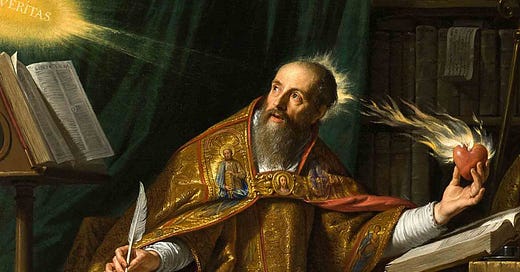St. Augustine and His Impact on Modern Anglican Theology
St. Augustine of Hippo (354–430) is one of the most influential figures in Christian theology, and his legacy continues to shape the theological landscape of the Anglican tradition. As a bridge between the early Church Fathers and medieval scholasticism, Augustine's thought has profoundly influenced Protestant and Catholic theology alike. Anglicanism, emerging from the English Reformation with its distinctive blend of Catholic and Reformed elements, remains deeply indebted to Augustinian theology in areas such as grace, the Church, sacraments, and scriptural interpretation.
1. Augustine’s Doctrine of Grace and Anglican Soteriology
One of Augustine’s most enduring theological contributions is his doctrine of grace, especially as articulated in De Spiritu et Littera and De Praedestinatione Sanctorum. Augustine emphasized the absolute necessity of divine grace for salvation, rejecting any form of Pelagianism, which held that human free will was sufficient for righteousness. His views on original sin and the need for prevenient grace profoundly influenced the soteriology of Anglicanism, particularly through the works of figures such as Thomas Cranmer and Richard Hooker.
The Thirty-Nine Articles of Religion, a foundational document of Anglican belief, reflect Augustinian ideas, especially in Article IX (Of Original or Birth-Sin), which states that “man is very far gone from original righteousness” and requires the grace of God for salvation. Furthermore, Article XVII (Of Predestination and Election) echoes Augustine’s doctrine of predestination, albeit with a pastoral tone that avoids the more rigid determinism of later Calvinism. The Anglican emphasis on justification by faith alone, as seen in Article XI, also owes much to Augustine’s formulation of grace preceding and enabling faith.
2. Augustine’s Ecclesiology and Anglican Identity
Augustine’s understanding of the Church as a mixed body (corpus permixtum) of saints and sinners has been fundamental to Anglican ecclesiology. In De Civitate Dei, he distinguishes between the City of God and the City of Man, emphasizing that the visible Church contains both the elect and the reprobate until the final judgment. This concept has helped Anglicanism maintain a broad and inclusive approach to membership, resisting both rigid Puritan separatism and overly centralized ecclesiastical control.
The Anglican via media (middle way) between Roman Catholicism and Protestantism reflects Augustinian ecclesiology by affirming the necessity of the visible Church and its sacraments while upholding the primacy of divine grace over institutional structures. Augustine’s defense of episcopal authority also helped shape the Anglican commitment to apostolic succession, even while allowing for Protestant doctrinal reform.
3. Augustine and the Anglican Sacramental Theology
Augustine’s sacramental theology, particularly his doctrine of ex opere operato (the sacraments being effective because of God’s promise rather than the minister’s holiness), remains significant for Anglican sacramental thought. His understanding of baptism as the means of regeneration is reflected in the Anglican liturgy, particularly in the Book of Common Prayer, which affirms that baptism is “an outward and visible sign of an inward and spiritual grace.”
Augustine’s nuanced view of the Eucharist also influenced Anglican debates on the Real Presence. While rejecting a crude materialism, Augustine affirmed that Christ is truly present in the sacrament, albeit in a spiritual and mystical manner. The Anglican tradition, particularly through Hooker and later figures like John Jewel, has maintained this Augustinian balance, avoiding both Roman transubstantiation and purely symbolic interpretations of the Eucharist.
4. Augustine’s Influence on Anglican Biblical Interpretation
Augustine’s approach to Scripture, emphasizing both its literal and allegorical meanings, has shaped Anglican hermeneutics. His insistence that scriptural interpretation must be guided by love for God and neighbor influenced Anglican theologians such as Lancelot Andrewes and N.T. Wright, who advocate for a reading of Scripture that is both theologically rich and pastorally relevant.
Moreover, Augustine’s view of Scripture as authoritative yet requiring ecclesial interpretation aligns with the Anglican balance between sola scriptura and the Church’s interpretative tradition. The Anglican emphasis on reason and tradition alongside Scripture reflects Augustine’s belief that faith and reason are not opposed but complementary.
St. Augustine’s theological legacy is woven deeply into the fabric of Anglican thought. His doctrines of grace, ecclesiology, sacramental theology, and scriptural interpretation have provided Anglicanism with a theological foundation that is both catholic and reformed. As Anglicanism continues to engage with contemporary theological and cultural challenges, Augustine’s insights remain a vital resource for navigating the tensions between tradition and reform, authority and freedom, and grace and human responsibility. In many ways, the enduring influence of Augustine ensures that Anglicanism remains, as he would have it, a faith that seeks understanding in the light of God’s grace.





